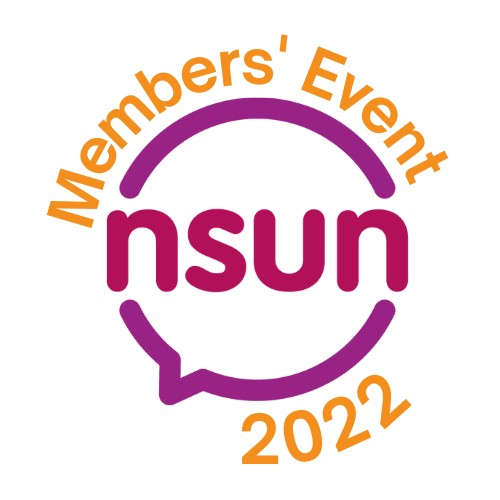This year we have five sessions taking place on Tuesday 15th November.
You can find out more and register for each session you are interested in using the buttons below. If you would prefer that we register you for sessions, please get in touch with info@nsun.org.uk with the names of the sessions you would like to sign up for and the email address you’d like us to use, along with any accessibility requirements.
After registering for the sessions of your choice, you should receive the Zoom links straight away – do get in touch if you don’t receive your joining links (and remember to check your spam)!
We ask that attendees agree to the principles of our group agreement to keep the space as safe as possible for everyone.
After the sessions take place, recordings (where applicable) will be added to the pages below.
Tuesday 15th November 2022
Telling the Story of Survivor History and Activism
9am – 10.30am
Mental health survivor activism has a long as rich history of individual and collective stories, but the grassroots nature of a lot of lived-experience led organising means it isn’t always documented “in the history books”. We also have to reckon with epistemic injustice (injustice around knowledge), such as silencing, misrepresenting, and the undervaluing of knowledge existing outside of formal and professional spaces.
This session will revolve around thinking about what it means to “archive” survivor history: whose and which stories get told? Who tells them and how? What does it mean to have our histories recorded and shared?
With Akiko Hart, Mark Brown, and Naomi Salisbury.
Abolition and Mental Health with Synergi
11am – 12.30pm
Unfortunately due to speaker illness this session is now cancelled. We are looking to rearrange it for sometime soon and will let registrants know as soon as a new date is confirmed.
In recent years the term abolition has gained traction in the mainstream as a critique of prisons and policing, but what is it and how does it relate to a mental health context? Here, we’ll unpack how mental health care can replicate carceral systems and expose people to harm, the historical connections between mental health institutions and prisons, and why abolition (and alternatives to state care provided by user-led groups) has and can provide some of the solutions to these harms.
Synergi, which is hosted by NSUN, is a project that will look at mental health and racial justice through an abolitionist lens. Join us for our first public event as we explore some of the core concerns of our work.
With Alaina Heath (Synergi/NSUN), Kelsey from Cradle Community, and Micha Frazer-Carroll.
Reimagining Safety Workshop
2pm – 3.30pm
Registration update: this session is now full. If you would like to be added to the waitlist, please email us at info@nsun.org.uk.
Many people with lived experience of mental ill-health, distress or trauma can name at least one moment in our lives where we felt ourselves being perceived no longer as a person but as a ‘risk’ or ‘at risk’. The negative impacts of safeguarding practices and the assumptions they’re built on are particularly severe for Black people and people of colour, young people and people who experience particularly stigmatised forms of distress.
In this workshop, we unpick some assumptions around safety and agency in mental health. We are particularly interested in exploring safeguarding in relation to hearing voices, suicidality, criminalisation and young people’s mental health.
With Ruairi White, Kadra Abdinasir and Fiona Malpass.
Mental Health in a Hostile Environment
4pm – 5pm
Increasingly, there are conversations in mental health spaces about racial justice and the experiences of racialised groups but these conversations and programmes of work rarely include the mental health of those subject to the hostile environment. This is despite people with precarious immigration status being widely understood to experience increased levels of mental ill-health and distress. Many people with insecure status are excluded from services, and user-led community spaces can be the only source of support available.
In this discussion session, we’re bringing together people organising across mental health and migrant justice to unpack the present context and explore how we can move forward in solidarity.
With Mary Sadid, Michaele Nagac, Jane Williams, and Munya Radzi.
Backstage: the Social Space
5.30pm – 6.30pm
Join the NSUN team for a lightly facilitated session at the end of the day which will be a chance to informally reflect on the day’s sessions and meet new people from the NSUN membership in a relaxed atmosphere.
